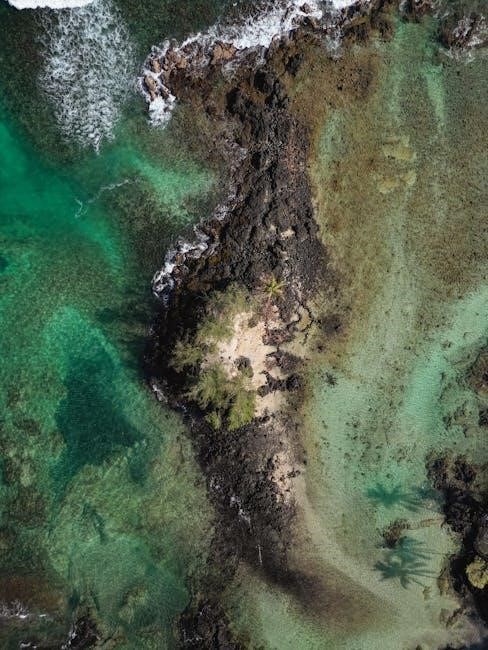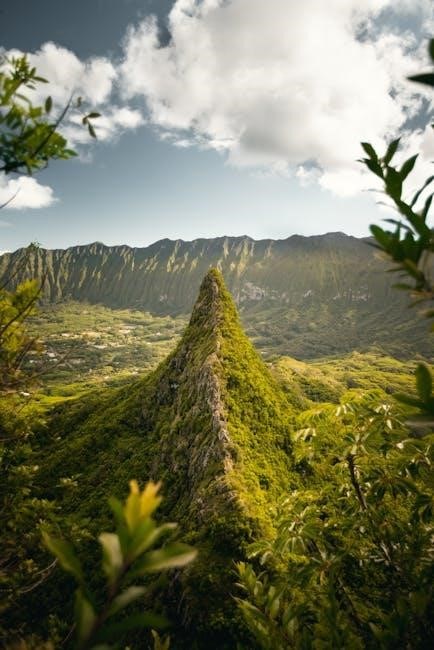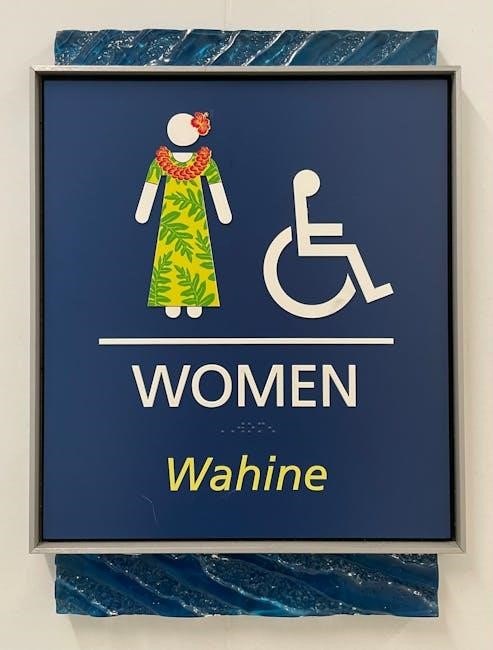This guidebook‚ edited by Hōkūlani K. Aikau and Vernadette Vicuña Gonzalez‚ challenges stereotypes and offers alternative narratives‚ redefining tourism through essays‚ art‚ and maps that highlight Hawaiian identity and resilience.
1.1 Overview of the Guidebook and Its Purpose
Detours: A Decolonial Guide to Hawaii reimagines traditional travel guides by challenging colonial narratives and offering alternative perspectives. It seeks to shift the focus from Hawaii as a tourist destination to a place with rich Indigenous histories and ongoing struggles. Through essays‚ art‚ and maps‚ the guidebook provides a deeper understanding of Hawaii’s cultural and environmental landscapes‚ encouraging readers to engage ethically and respectfully with the islands and their communities.
1.2 Editors and Contributors: Hōkūlani K. Aikau and Vernadette Vicuña Gonzalez
Hōkūlani K. Aikau and Vernadette Vicuña Gonzalez are scholars and activists who co-edited Detours: A Decolonial Guide to Hawaii. Aikau‚ a Native Hawaiian scholar‚ and Gonzalez‚ a professor at the University of Hawaii‚ bring decolonial perspectives to the guidebook. They assembled a diverse group of contributors‚ including scholars‚ artists‚ and activists‚ to challenge colonial narratives and offer alternative ways of understanding Hawaii’s history‚ culture‚ and environment‚ emphasizing Indigenous voices and experiences.

The Concept of Decolonial Tourism in Hawaii
Decolonial tourism challenges stereotypes‚ redefining Hawaii through Indigenous perspectives‚ emphasizing ethical engagement‚ and honoring local cultures‚ environments‚ and communities to foster meaningful‚ responsible travel experiences.
2.1 Challenging Stereotypes and Colonial Narratives
Detours challenges the clichéd imagery of Hawaii as a tropical paradise‚ addressing the historical and ongoing impacts of colonialism. It redirects the tourist gaze by exposing how stereotypes like hula girls and luaus mask the struggles of Native Hawaiians‚ such as food insecurity and climate change. By examining the legacy of colonialism and militarism‚ the guidebook offers a critical lens to understand Hawaii’s complex identity and the importance of ethical engagement with its culture and environment.
2.2 Redefining Tourism Through Indigenous Perspectives
Detours redefines tourism by centering indigenous voices‚ offering essays‚ art‚ and maps that reflect Native Hawaiian perspectives. It shifts focus from colonial fantasies to authentic stories‚ encouraging visitors to engage ethically and respectfully; By amplifying local connections‚ the guide decolonizes travel‚ promoting practices that honor Hawaii’s culture and environment‚ and inspiring a more mindful approach to exploring the islands.
Alternative Narratives and Stories in Detours
Detours presents alternative ways to explore Hawaii through essays‚ art‚ and maps‚ offering fresh perspectives beyond traditional tourism‚ highlighting local stories and hidden histories.

3.1 Essays‚ Art‚ and Maps: A New Way to Explore Hawaii
Detours: A Decolonial Guide to Hawaii reimagines tourism through innovative storytelling‚ blending essays‚ art‚ and maps to explore the islands’ rich cultural landscapes and hidden histories. Contributors share diverse perspectives‚ offering travelers a deeper connection to Hawaii’s environment‚ history‚ and communities. This approach challenges colonial stereotypes‚ fostering a more respectful and ethical engagement with Hawaiian culture and landscapes.

3.2 Hidden Histories and Local Connections
Detours: A Decolonial Guide to Hawaii uncovers the islands’ lesser-known stories‚ emphasizing local voices and overlooked histories. By connecting places to people‚ the guide reveals how colonialism‚ tourism‚ and environmental changes have shaped Hawaii. It offers practical advice for engaging with communities respectfully‚ encouraging travelers to move beyond surface-level experiences and foster meaningful connections with the land and its people.

The Role of Art and Visual Culture in the Guide
Art and visual culture in Detours challenge colonial stereotypes‚ offering a platform for Native Hawaiian perspectives. Through illustrations‚ maps‚ and photography‚ the guide decolonizes tourism narratives‚ providing a deeper connection to the islands’ history and identity. Visual elements highlight local stories‚ fostering a more nuanced understanding of Hawaii’s cultural and historical contexts.
4.1 Using Art to Reclaim and Represent Hawaiian Identity
Detours employs art as a powerful tool to reclaim and represent Hawaiian identity‚ challenging colonial narratives. Through illustrations‚ photography‚ and visual storytelling‚ the guidebook amplifies Native Hawaiian voices and perspectives‚ offering a counterpoint to traditional tourist imagery. This artistic approach fosters a deeper understanding of Hawaii’s history‚ culture‚ and resilience‚ encouraging visitors to engage with the islands on a more authentic and respectful level.
4.2 Visual Elements: Maps‚ Illustrations‚ and Photography
The guidebook incorporates maps‚ illustrations‚ and photography to present Hawaii beyond tourist clichés. These visual elements‚ often created by local artists‚ highlight historical sites‚ cultural landscapes‚ and contemporary issues. Maps redraw boundaries to emphasize Native Hawaiian perspectives‚ while illustrations and photographs challenge colonial imagery‚ offering a more nuanced portrayal of the islands. These visuals complement the text‚ enriching the narrative and inviting readers to engage deeply with Hawaii’s complex identity and history.

Engaging with Hawaii Beyond Tourism
Detours encourages readers to move beyond tourism by connecting with local communities‚ respecting cultural practices‚ and ethically engaging with Hawaii’s environment and people.
5.1 Practical Advice for Ethical Travel
Detours offers practical advice for ethical travel‚ emphasizing respect for Hawaiian culture and the environment. It encourages visitors to avoid exploiting local resources and to engage thoughtfully with communities‚ supporting local businesses and understanding historical contexts.
5.2 Supporting Local Communities and Businesses
Detours emphasizes the importance of supporting local communities and businesses to foster economic sustainability and cultural preservation. By prioritizing Native Hawaiian-owned enterprises and engaging with grassroots initiatives‚ visitors can contribute positively to the islands. This approach encourages a shift away from corporate-dominated tourism‚ promoting equitable development and strengthening community ties.
Environmental and Social Challenges in Hawaii
Hawaii faces climate change‚ food insecurity‚ and social inequities rooted in colonial legacies. These challenges highlight the need for sustainable practices and equitable solutions to preserve the islands’ future.

6.1 Climate Change‚ Food Insecurity‚ and Colonial Legacy
Hawaii faces pressing challenges like climate change‚ with rising sea levels and coastal erosion threatening ecosystems. Food insecurity persists due to historical shifts from sustainable practices to monocrop agriculture. The colonial legacy has disrupted traditional land use and food systems‚ exacerbating these issues. Native Hawaiian communities are disproportionately affected‚ highlighting the need for decolonial practices to restore balance and promote sustainable solutions for the islands’ future.
6.2 The Impact of Tourism on Native Hawaiian Communities
Tourism in Hawaii has profoundly impacted Native Hawaiian communities‚ often displacing them from ancestral lands and cultural sites. The influx of visitors strains resources‚ drives up living costs‚ and perpetuates stereotypes. Many Native Hawaiians face marginalization‚ as tourism prioritizes profit over cultural preservation; Addressing these issues requires ethical practices that support local communities and acknowledge the historical legacies of colonialism‚ ensuring a more equitable and sustainable tourism model for the islands.
Decolonial Practices for Travelers
Detours: A Decolonial Guide to Hawaii encourages travelers to engage ethically‚ respect Native Hawaiian culture‚ and support local communities‚ fostering a more mindful and impactful visit.

7.1 Understanding and Respecting Native Hawaiian Culture
Detours emphasizes the importance of moving beyond stereotypes and engaging deeply with Native Hawaiian history‚ language‚ and traditions. By exploring these elements‚ travelers can foster meaningful connections and respect for the islands’ rich cultural heritage‚ acknowledging the impacts of colonialism and tourism while promoting mindful and ethical interactions with local communities.

7.2 Ethical Travel Practices: What Visitors Can Do
Visitors can adopt ethical practices by supporting local businesses‚ respecting sacred spaces‚ and engaging in environmentally conscious behaviors. Educating oneself about Hawaii’s history‚ sovereignty‚ and cultural norms fosters deeper understanding and respect. By prioritizing reciprocity and mindfulness‚ travelers can contribute to the preservation of Hawaiian communities and landscapes‚ ensuring their visits benefit rather than harm the islands and their people.
The Broader Impact of Detours
Detours challenges stereotypes and shifts perceptions of Hawaii‚ inspiring a wave of decolonial travel guides. Its innovative approach fosters cultural respect and sparks global conversations about ethical tourism.

8.1 Changing Perceptions of Hawaii and Its History
Detours challenges stereotypes‚ offering a decolonial lens that reveals Hawaii’s complex history beyond tourist clichés. Through essays‚ art‚ and maps‚ it shifts perceptions‚ highlighting Native Hawaiian struggles and resilience. By sharing hidden histories and local connections‚ the guide encourages readers to engage deeply with the islands’ cultural and political landscapes‚ fostering a more nuanced understanding of Hawaii’s past and present. This approach transforms tourism into a meaningful journey of discovery and respect.
8.2 The Future of Decolonial Travel Guides
Detours: A Decolonial Guide to Hawaii sets a transformative precedent for travel guides‚ challenging conventional tourism narratives. By amplifying Indigenous voices and histories‚ it inspires a shift toward decolonial perspectives in travel writing. This approach encourages readers to engage with destinations more thoughtfully‚ fostering cultural and environmental sustainability. As the first in a series‚ Detours paves the way for future guides that prioritize ethical exploration and respect for local communities worldwide.